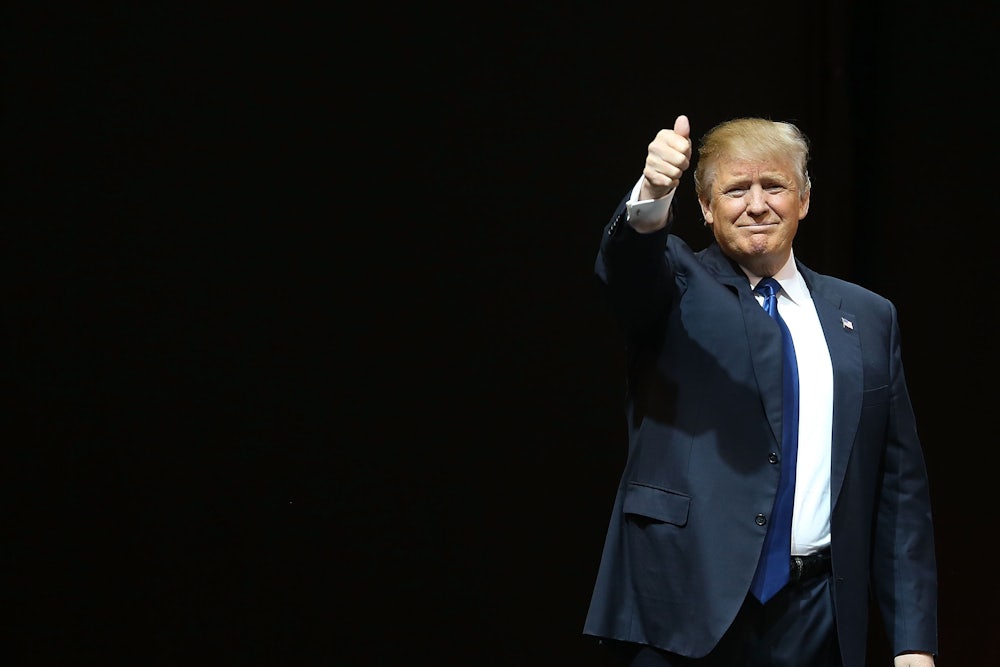About halfway through the five stages of Republican despair over the state of the presidential primary—after Donald Trump shot to the top of the polls, but before most people came to terms with the durability of his support—the commentariat (both conservative and liberal) took solace in the assumption that Trump couldn’t withstand even a single loss.
Trump’s brand, according to this conventional wisdom, was so synonymous with winning—always winning—that losing would reveal his political persona to be a facade, and his support would melt away.
This analysis reflected at least two significant and related misunderstandings. First, Trump’s setbacks in the business world were well known, decidedly not fatal, and should’ve called into doubt the view that losing is Kryptonite to Trump. But it was also based on an outright misreading of Trump’s political persona, which combined issue positions and affects that appeal to large masses of Republican voters, with a promise that overall, and in the long run, Trump wins.
In that light, it’s no surprise that after slightly underperforming in the Iowa caucuses by coming in second to Ted Cruz, Trump turned around and lapped the field in New Hampshire.
Trump’s victory, and the magnitude of his victory, is a political cataclysm for the Republican Party. When it became clear that Trump would win, the GOP establishment’s parting hope was that Trump’s margin would thin, and he’d once again face a storyline about his inability to meet expectations; that he’d lose by winning. Instead he more than doubled the support of the second-place finisher, John Kasich. This gives Trump an early delegate lead going into nominating contests in South Carolina and Nevada, where he also enjoys commanding advantages in public polls.
Trump’s path to the nomination just expanded back to its pre-Iowa thickness. And the biggest contributing factor to Trump’s resurgence—the second biggest story out of New Hampshire—is the Republican Party leadership’s near-total loss of control over its candidate pool. Had Senator Marco Rubio, rather than Kasich, finished second in New Hampshire—had he managed to capitalize on his third-place showing in Iowa—the story tonight would be dramatically different.
Instead, everything that’s happened since last Monday has served as a reminder that the Republican establishment is hanging its fortunes on extremely thin reeds.
We can trace the disarray within the Republican establishment to multiple origins—to Jeb Bush’s early stumbles and his toxic association with his brother’s failed presidency; to the Supreme Court’s Citizens United decision, which has made it possible for dark-horse candidates to sustain candidacies long past their natural expiration dates; to the Republican Party’s opportunistic appeals to reactionary sentiment for short-term political gain. These determinants have stripped Republicans of the tools they need to make strategically sound institutional decisions. The imperative to nominate anyone but Trump or Cruz has driven Republicans to lend immense significance to dubious indications of electability.
After Iowa, and despite a third-place finish, Rubio briefly benefited from a deluge of endorsements and campaign donations on the basis of the impression that he was both uniquely electable and uniquely capable of uniting the party. These notions took hold despite widespread awareness of Rubio’s thin resume and inability to act with a clear head under pressure. His momentum was thus extremely fragile and after one public demonstration that the concerns were valid, it collapsed. Tonight he finished fifth.
If it’s true that Trump has a low ceiling, or that the party will eventually align behind someone—anyone—who can defeat him, Tuesday was a great night for Cruz, who (with a majority of precincts reporting) finished an unexpectedly strong third, or fourth-place Bush (who unlike Cruz, is well-liked by party actors). Both men helm sophisticated, well-financed campaigns. Kasich does not. But just a week after the pervasive doubts about the establishment’s competence were abating, when the moment of consolidation seemed to be upon us, it’s suddenly unclear if, when, or how it will really arrive.
